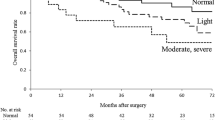Abstract
Purpose
This study investigated whether or not the impact of malnutrition, as defined by the Global Leadership Initiative on Malnutrition (GLIM) criteria, on the long-term prognosis after gastrectomy differed between older and young patients with advanced gastric cancer.
Methods
This study included patients with primary stage I–III gastric cancer who underwent gastrectomy between April 2008 and June 2018. Patients were divided into normal, moderate, and severe malnutrition groups according to the GLIM criteria for the body mass index (BMI) and body weight loss (BWL). The primary endpoint was the overall survival (OS).
Results
Of the 512 patients, 274 (53.5%) were included in the younger group (< 70 years old) and 238 (46.5%) in the older group (≥ 70 years old). The prevalence of moderate and severe malnutrition was significantly higher in the older group than in the younger group (P < 0.001 and P = 0.001, respectively). A multivariate analysis showed that moderate malnutrition [hazard ratio (HR) 1.793, P = 0.028] and severe malnutrition (HR 2.374, P = 0.002) were independent prognostic factors in the older group but not in the younger group.
Conclusion
GLIM criteria-defined malnutrition did not correlate with the prognosis in the younger group, whereas moderate and severe malnutrition were independent poor prognostic factors for the OS in the older group.


Similar content being viewed by others
References
Cederholm T, Jensen GL, Correia MITD, Gonzalez MC, Fukushima R, Higashiguchi T, et al. ; GLIM Core Leadership Committee; GLIM Working Group; GLIM criteria for the diagnosis of malnutrition–a consensus report from the global clinical nutrition community. Clin Nutr. 2019;38(1):1–9.
Weimann A, Braga M, Carli F, Higashiguchi T, Hübner M, Klek S, et al. ESPEN guideline: clinical nutrition in surgery. Clin Nutr. 2017;36(3):623–50.
Weimann A, Braga M, Carli F, Higashiguchi T, Hübner M, Klek S, et al. ESPEN practical guideline: clinical nutrition in surgery. Clin Nutr. 2021;40(7):4745–61.
Harada K, Baba Y, Ishimoto T, Kosumi K, Tokunaga R, Izumi D, et al. Low visceral fat content is associated with poor prognosis in a database of 507 upper gastrointestinal cancers. Ann Surg Oncol. 2015;22:3946–53.
Skeie E, Tangvik RJ, Nymo LS, Harthug S, Lassen K, Viste A. Weight loss and BMI criteria in GLIM’s definition of malnutrition is associated with postoperative complications following abdominal resections–results from a national quality registry. Clin Nutr. 2020;39:1593–9.
Matsui R, Inaki N, Tsuji T. Impact of visceral adipose tissue on compliance of adjuvant chemotherapy and relapse-free survival after gastrectomy for gastric cancer: a propensity score matching analysis. Clin Nutr. 2021;40:2745–53.
Xu LB, Shi MM, Huang ZX, Zhang WT, Zhang HH, Shen X, et al. Impact of malnutrition diagnosed using global leadership initiative on malnutrition criteria on clinical outcomes of patients with gastric cancer. JPEN J Parenter Enteral Nutr. 2022;46:385–94.
Suzuki S, Kanaji S, Yamamoto M, Oshikiri T, Nakamura T, Kakeji Y. Controlling nutritional status (CONUT) score predicts outcomes of curative resection for gastric cancer in the elderly. World J Surg. 2019;43:1076–84.
Hirahara N, Matsubara T, Fujii Y, Kaji S, Hyakudomi R, Yamamoto T, et al. Preoperative geriatric nutritional risk index is a useful prognostic indicator in elderly patients with gastric cancer. Oncotarget. 2020;11:2345–56.
Rinninella E, Cintoni M, Raoul P, Pozzo C, Strippoli A, Bria E, et al. Muscle mass, assessed at diagnosis by L3-CT scan as a prognostic marker of clinical outcomes in patients with gastric cancer: a systematic review and meta-analysis. Clin Nutr. 2020;39:2045–54.
Yang Z, Zhou X, Ma B, Xing Y, Jiang X, Wang Z. Predictive value of preoperative sarcopenia in patients with gastric cancer: a meta-analysis and systematic review. J Gastrointest Surg. 2018;22:1890–902.
Kamarajah SK, Bundred J, Tan BHL. Body composition assessment and sarcopenia in patients with gastric cancer: a systematic review and meta-analysis. Gastric Cancer. 2019;22:10–22.
Nishigori T, Tsunoda S, Obama K, Hisamori S, Hashimoto K, Itatani Y, et al. Optimal cutoff values of skeletal muscle index to define sarcopenia for prediction of survival in patients with advanced gastric cancer. Ann Surg Oncol. 2018;25:3596–603.
Matsui R, Inaki N, Tsuji T. Impact of visceral adipose tissue on long-term outcomes after gastrectomy for advanced gastric cancer. Nutrition. 2022;97: 111619.
Taniguchi Y, Kurokawa Y, Takahashi T, Saito T, Yamashita K, Tanaka K, et al. Impacts of preoperative psoas muscle mass and visceral fat area on postoperative short- and long-term outcomes in patients with gastric cancer. World J Surg. 2021;45:815–21.
Huo Z, Chong F, Yin L, Lu Z, Liu J, Xu H. Accuracy of the GLIM criteria for diagnosing malnutrition: a systematic review and meta-analysis. Clin Nutr. 2022;41:1208–17.
Funding
This research did not receive specific grants from funding agencies in the public, commercial, or not-for-profit sectors.
Author information
Authors and Affiliations
Contributions
RM and NI contributed equally to the conception and design of the research; RM and TT contributed to the acquisition and analysis of the data; RM and NI contributed to the interpretation of the data; and RM and NI drafted the manuscript. All authors critically revised the manuscript, agreed to be fully accountable for ensuring the integrity and accuracy of the work, and read and approved the final manuscript.
Corresponding author
Ethics declarations
Conflict of interest
The authors declare no conflicts of interest.
Ethical approval
The study protocol was approved by the Institutional Ethical Review Committee of Ishikawa Prefectural Central Hospital (authorization number: 1875).
Additional information
Publisher's Note
Springer Nature remains neutral with regard to jurisdictional claims in published maps and institutional affiliations.
Rights and permissions
Springer Nature or its licensor holds exclusive rights to this article under a publishing agreement with the author(s) or other rightsholder(s); author self-archiving of the accepted manuscript version of this article is solely governed by the terms of such publishing agreement and applicable law.
About this article
Cite this article
Matsui, R., Inaki, N. & Tsuji, T. Impact of malnutrition as defined by the global leadership initiative on malnutrition criteria on the long-term prognosis in older patients with gastric cancer after gastrectomy. Surg Today 53, 578–587 (2023). https://doi.org/10.1007/s00595-022-02594-5
Received:
Accepted:
Published:
Issue Date:
DOI: https://doi.org/10.1007/s00595-022-02594-5




